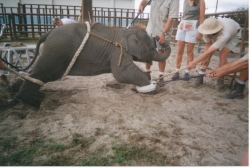Which do “you” think is the more natural environment to see an elephant?
| Decorated Elephant in Chains being used in Temple Ceremony,
Varkala, Kerala, India |
Herd (extended family) of Elephants Grazing Freely,
Minneriya National Park, Sri Lanka |
Do you know how intelligent and social elephants actually are?
Elephants are highly intelligent, emotional, and social animals, they are very good at using tools, and they will work together cooperatively to solve problems. You can easily find simple video evidence online that they have both empathy and emotion, look for yourself for elephants crying like Raju, or an elephant reunion after 20 years like with Shirley and Jenny, and then decide for yourself.
See also “The Science Is In: Elephants Are Even Smarter Than We Realized”,
Scientific American by Ferris Jabr, February 26, 2014
Can you appreciate the connection between cause and effect of “training”.
| Baby Circus Elephant being “trained” in North America
Image courtesy of Heather Norwood (http://www.peta.org) [GFDL (http://www.gnu.org/copyleft/fdl.html) or CC BY-SA 3.0 (http://creativecommons.org/licenses/by-sa/3.0)], via Wikimedia Commons |
Junior Elephant showing signs of extreme stress (PTSD) from “training”. “Yipsee” now does this rocking forward and backward behavior non-stop – all day long, every single day.
Elephant Camp along the Mae Kok River, Chiang Mai Province, Thailand. Video by Brant Bady at https://youtu.be/HN9rK0_G0bY |
In order to be even moderately safe around people or for riding or “performing”, elephants in captivity must be “broken” physically and mentally – that is the first of many times an elephant will be abused, and at a very early age normally.
Do you fully understand the potential risks to your own person by riding an elephant?
| Screen grab of You-tube video footage https://www.youtube.com/watch?v=F97RZ-IYWcU, shot by News Hour India, Kerala India, 2016
This temple elephant was on a four hour-long rampage until it was brought under control. This frame shows where it has lifted the yellow auto-rickshaw (approx. 650 lbs) right off the ground with its tusks, and is about to smash it on the ground into pieces |
If you think that elephants at so-called “Elephant Camps” are completely safe to ride, you would be wrong. They have been known to use their tusks to impale people, or use their feet to stomp tourists to death – this is after being “broken”. The males are particularly dangerous when they go into “musth” – an up to 60 times increase in their reproductive hormones. At the same elephant camp where Yipsee was kept, a full grown male was shackled to a huge log approx. 30 ft long. That elephant became angry apparently and took off dragging the log at full speed like it was merely a twig
If it’s not okay to support or morally condone the torture and abuse of people, why would it be okay for animals?
| Video of an Elephant in Kerala India being beaten, by Bibi Kallai https://www.facebook.com/shafeek.kallai/videos/10151115361770774/ |
Videographers Description: Dear Friends, I shot this video when I visited Elephant Sanctuary at Guruvayoor, (Thrissur Dist. Kerala, India.) on 3rd of January 2010. This is very cruel, people behaviour towards animals. I was threatened while I was shooting this video and such a difficulty I could finish it. I kept this video all these days under the cover. I heard that elephant named “Arjun” is not in a position to walk as the mahouts hit him to the core and left leg had broken. Considering Arjuns case he is one of the best elephants in Kerala. I seriously don’t know why these government servants behave this way to Elephants. Please share video if you love ELEPHANTS
| Abuse at Abu Ghraib Prison, Iraq
Image Courtesy of United States Armed Forces [Public domain or Public domain], via Wikimedia Commons |
Elephant Showing Severe Wounds from being in Chains. Kerala Province, India
Image courtesy of bincymb (Own work) [CC BY-SA 4.0 (http://creativecommons.org/licenses/by-sa/4.0)], via Wikimedia Commons |
You should not think there is a moral equivalency between these two pictures – because there isn’t, and you would much prefer to be a prisoner at Abu Ghraib than to be a captive elephant, broken and forced to perform, entertain, and decorate.
It is completely shameful that in 2016, elephants are still being mistreated this way. Elephants belong in wild, where they can forage unfettered by chains or elephant hooks, where they can be elephants, not enslaved and abused performers doing un-natural acts for the purposes of entertainment, and where they can be happy and socialize with their extended families.
|
|
| Free Ranging Wild Elephants, Yala National Park, Sri Lanka |
Instead of riding elephants, please do:
Support elephant habitat growth – this is the biggest problem – there are way more elephants at work performing than there is available habitat for them to be relocated to. In fact, habitat is shrinking. Sanctuaries are not the best solution, they should be viewed only as temporary or staging initiatives, or as a last resort when elephants cannot be released
Support the appropriate feeding and care of captive elephants who are not used for commercial, entertainment, or social/religious entertainment purposes. Elephants are expensive to keep, and because of their longevity, are often inherited from previous owners. If you do travel to countries that have elephants, do your research and only patronize places where NO riding or use for entertainment takes place. It’s usually okay to purchase food for them to eat, or donate for their care.
Safari’s in National Parks with well-managed elephant reserves are another option, although an admittedly imperfect one – you may get closer to elephants than you really want! Having been charged a couple times when parked in a jeep the path of moving of elephants – it is a far far better thing for them to be communicating their limits of interaction to us, than for us to be torturing them into being able to be ridden, or to perform unnatural behaviors for entertainment performances.
Support elephant rescue projects, and campaigns that are effective in both raising awareness and those that are active in eliminating abuses and changing the tourist industry’s exploitation of elephants http://www.worldanimalprotection.org/news/world-elephant-day-elephants-never-forget-their-suffering-entertainment, and their recent report explicitly lists a number of venues that do not promote riding of elephants or use for entertainment.
On a positive note, here are some videos of fantastic experiences with elephants
https://www.facebook.com/TOPSmileLike/videos/1740428866208703/ A baby elephant emulating its caretaker by playing at sliding on wet grass.
https://www.facebook.com/585490911588848/videos/732330406904897/ When an elephant has got your back! This elephant tries to “save” person it thinks is in trouble in the river.
https://www.facebook.com/TOPSmileLike/videos/1788130614771861/ Playing “Tag You’re It”, with a young elephant









